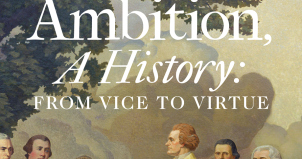Questioning Ambition
Read William Casey King’s “Three Things All Ambitious People Should Know” on the Wall Street Journal‘s “Speakeasy” blog!
In credo of “life, liberty, and the pursuit of happiness,” there seems an implicit acknowledgement of ambition–should one’s desires take you so far. This picture in American life is particularly central to our own understanding of national history and culture. Here, we present a Q&A with William Casey King, author of Ambition, A History: From Vice to Virtue, whose previous work as a Salomon Brothers bond trader interestingly informed his work as an historian of this significant human concept. He considers why our cultural perceptions of ambition have changed over the generations or even how they can change over the course of a lifetime. From ambition’s relationship with extremism to its ambiguity and alternating celebration and demise, King‘s analysis suggests that even in the twenty-first century, ambition has never fully lost its ties to vice and continues to exhibit a dual nature, positive or negative depending upon the ends, the means, and the individual involved.
Yale University Press: How did you first become interested in the topic of ambition?

William Casey King
William Casey King: Working on Wall Street in the 1980s it was hard not to think about ambition. I was in the Sales and Trading Program at Salomon Brothers, made famous (or rather infamous) in Michael Lewis’ first book Liar’s Poker. If ambition is a beast, Solly in the 80’s was the belly. It’s interesting because the character of Gordon Gekko in Oliver Stone’s movie Wall Street, set in the 1980s, talked about greed. His famous speech from the movie was “greed is good,” which talked about how greed drives American production and innovation. But I think they got it wrong. As someone who knows that world and the people in it, it’s really not about greed—most are not driven by love of money. On Wall Street, money is ambition’s scoreboard. But it’s not just Wall Street. Scoreboards are all around us. Our achievements are continually quantified by titles, prizes, promotions, evaluations, batting averages, bylines. When I was Wall Street, I never imagined that I might someday write a book about ambition, though I knew my ambition lay elsewhere.
YUP: While America often is viewed as a nation with ambition as one of its defining values, in fact it had a strong cultural history well before the United States. What were some of the earliest records of ambition, and from where do they originate? How did they make the jump from Europe to America?
WCK: Ambition is as old as human history. It is easy to look back and see evidence of it whenever people express the desire to do the impossible, to become people who defy the expectations of birth, to conquer worlds like Alexander, to rise from obscurity to greatness of fame, to design machines, like Leonardo or the Wright Brothers so that man could fly like the birds, to know the mysteries of the universe like Galileo, to find a new sea route to India like Columbus, to conquer a city of gold like Cortez, to fly to the moon, and beyond. But ambition as we know it was also often seen as threatening to people in power. It threatened authority. It upset the apple cart. So for centuries it was defined as something bad, something that you should carefully hide, or not have at all. As a matter of fact, if you look at St. Augustine and St. Gregory’s definition of the seven deadly sins, the way they define “avarice” would include what we would call “ambition.” So, in a way, ambition should be included among the deadly sins. And when the first English colonists come to America, this negative attitude is carried with them. It is described in the Puritan texts as a “canker on the soul,” a “moth of holiness.” Satan is the sort of poster child for ambition. So, clearly, not a good thing. The amazing thing is the turn-around that my book describes. How did this awful thing become this American thing?
YUP: You tackle ambition’s ugly side, via the topic of race subjection in the Age of Exploration. This was experienced most keenly, you argue, by Native Americans and African Americans. In your research, how did you find oppression and ambition interrelated? Is it your view that it is possible to have a more refined version of ambition where it can exist without oppression?
WCK: Ambition is a relative concept. To be excellent or “better” is most often defined in terms of better than others, compared to another individual or group. Think about it: if everyone is excellent, then excellence is normal, and no one is excellent if everyone is excellent. You really see this when the Spanish first encounter the Native Americans— they are not sure what to make of them. Initially, they had a debate in Valladolid, a city in Spain, to decide exactly what sort of human beings these people were, whether they were born to be slaves of the Spanish, or citizens, barbarians, or should they just be considered individuals in a permanent state of childhood. . But there is no debate that they are imagined to be inferior. The same holds true for Africans, women or Jews in Nazi Germany.
This is ambition’s dark side and at the root of racism and extremism. Better is often imagined in these relative terms, at the expense of a degraded other, and ambition can be quite awful. If we want to get rid of racism in America, do we have to outlaw ambition? Obviously that’s not happening. But if we can reimagine ambition as the credo of self-improvement, as measured by internal standards, rather than relative ones, maybe it’s possible. It’s hard to imagine.
YUP: Benjamin Franklin is often cited as the epitome of American ambition. His well-known aphorism “Early to bed, early to rise makes a man healthy, wealthy, and wise,” actually was penned letter in his career and in his earlier years he felt ambition was distasteful. How did his changing opinion on ambition come to pass? And is this transition suggestive of America’s shifting attitude to ambition as well?
WCK: I remember when I was doing my research and I found this quote in a commonplace book, a diary people used to keep where they would write their favorite quotes or poems. The date on the book was 1670, 40 years before Franklin’s birth!
This isn’t to bash Franklin. He never claimed that what he wrote was original. But somewhere in our history we started creating these origin myths, and part of origin is originality. So we came to see Franklin and his aphorisms and America as if it had sprung from the earth without antecedent. Part of all this is imagining Ben Franklin as the poster-child for American ambition. His rise from printer’s apprentice to founding father, his success and fame that he won through hard work and temperance was held as a model for American ambition. That’s why I was shocked that in his first will and testament in 1755 Franklin thanks God for freeing him from ambition. I remember thinking why would he say that? Mister ambition doesn’t think he’s ambitious?! Why wouldn’t he want to be thought of that way? I guess this was my first clue that this book about ambition needed to start well before Franklin. As for “do attitudes towards ambition change during Franklin’s life?” Absolutely. And it’s the American Revolution where you see old attitudes toward ambition most seriously challenged.
YUP: You point out that Thomas Jefferson revised the opening line of the Declaration of Independence, in order to avoid having it be seen as a “declaration of ambition.” What was the change in the prose, from what to what? What does this say about the founding father’s view of ambition? Does this revised first line suggest a potential change in how we should view the document’s intended mission?
WCK: Pulitzer-prize winning historians have studied the evolution of Declaration of Independence, from Jefferson’s original rough draft to the document we know. Most argue that Jefferson changed his original because the revised draft sounded better. It changes from, “When in the course of human events it becomes necessary for a people to advance from that subordination in which they have hitherto remained, and to assume among the powers of the earth the equal and independent station,” to “When in the Course of human events, it becomes necessary for one people to dissolve the political bands which have connected them with another, and to assume among the powers of the earth, the separate and equal station…” In Jefferson’s original rough draft he talks not about separation, but advancing from subordination to an equal and independent station. Advancing, rising up to a certain station, having a higher station than god wants us to, is one of the ways ambition would have been defined in the eighteenth century. And ambition, in the eighteenth century, at the time of the Revolution, was still a dirty word, with deep ties in Anglo-American culture to sin.
If you called someone ambitious in the eighteenth century, it would be like calling someone a communist in the 50s, or a racist today. It is not something that you wanted to have hung on you. So when Jefferson either intentionally or unintentionally says in the original rough draft, it’s time for us to proclaim our ambition, for us to advance to an equal station, he shows it to Adams and Franklin and the change is made. It’s an easy thing to miss unless you spend 6 years thinking about ambition and tracing it through centuries. But once I had, I was better able to approach even the Declaration, American Scripture, with a fresh eye and a better understanding of the culture that shaped it.
YUP: What is America’s current view on ambition? Is it seen as admirable or as a more ambiguous value?
WCK: I think that the ambiguity still remains. It is seen as good or bad depending on who is expressing it and to what ends. For example, an ambitious woman is viewed in different terms than an ambitious man. We expect politicians to be ambitious, students should be, and art, music, film definitely. But I recently did an analysis of 30 years of New York Times data and what I found is that when we falter, we things aren’t going well for America, we tend to question ambition to a much greater extent. It’s natural. Like people whenever we have a bad spell, or things don’t seem to be working out the way we imagined they would, we turn inward and question ourselves. The, “if only I had been different,” introspective self-flagellation. So when things are going well, we tend to celebrate all that made us American, like ambition. But when things are going not as well, when the economy falters, we doubt even the most fundamental aspects of who we are as a nation and people.
William Casey King is executive director of the Yale Center for Analytical Sciences, Yale University. He was previously a Salomon Brothers bond trader and executive director of the W. E. B. DuBois Institute of African and African American Research, Harvard University. He lives in Hamden, CT. Ambition, A History: From Vice to Virtue is available now from Yale University Press.



























